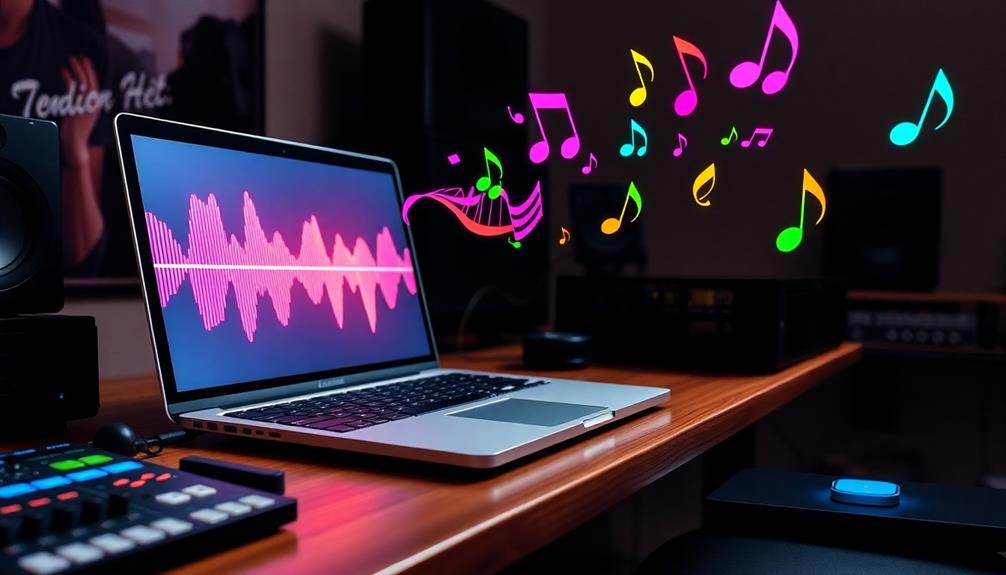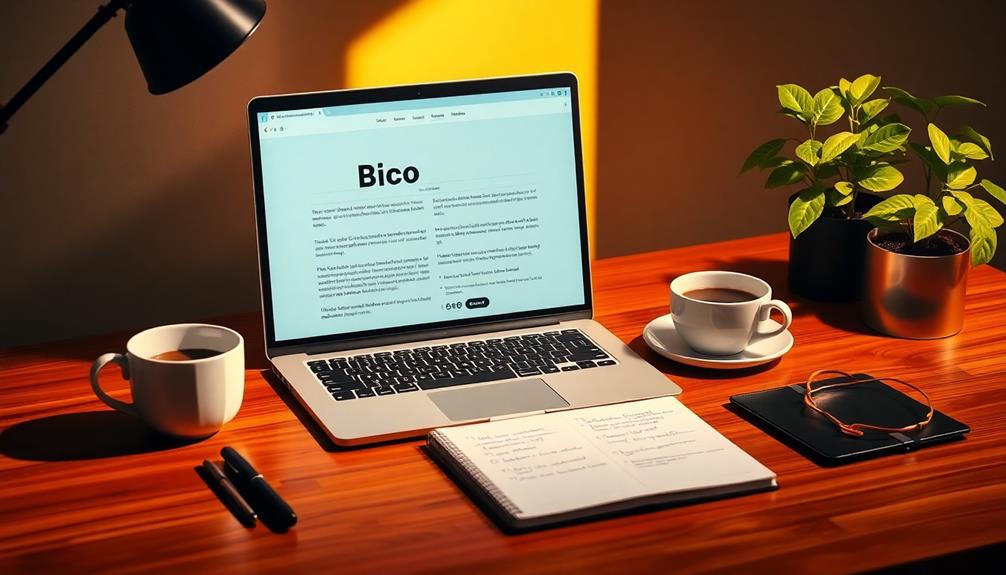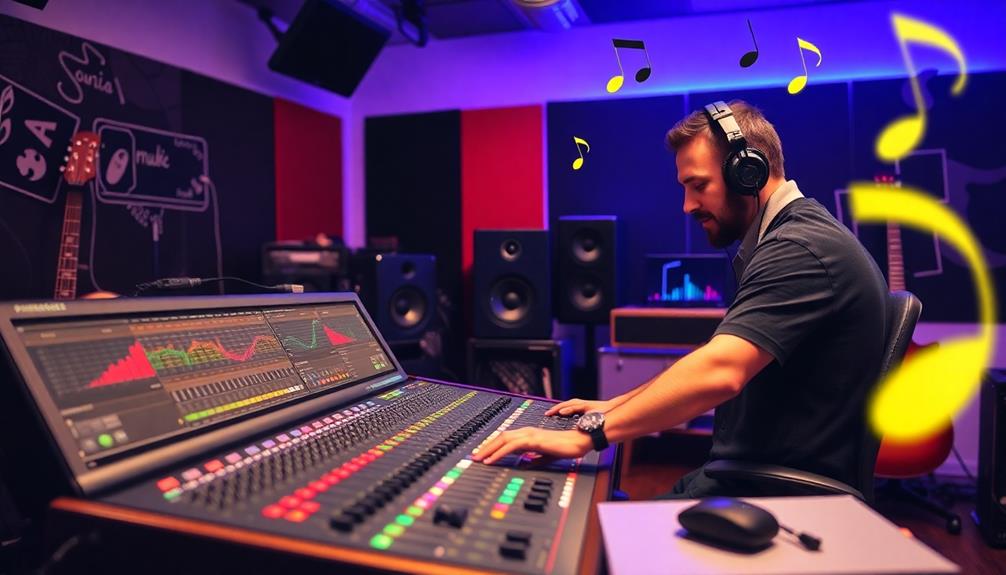Creating a website for your music production business is essential for boosting your visibility and attracting clients. Start by choosing a user-friendly builder like Wix or WordPress. Focus on essential features like a music player, portfolio showcase, and easy navigation. Incorporate engaging multimedia elements to connect with your audience, and guarantee your contact info is readily available. Don't forget to use social media and mailing lists for promotion and fan engagement. With the right strategies, your website can become a powerful tool for growth and connection in the music industry. Explore more to elevate your online presence!
Key Takeaways
- Choose a user-friendly website builder like Wix or WordPress to easily create and customize your music production site.
- Integrate a music player for streaming, downloading, and purchasing options to engage visitors and showcase your work.
- Include a portfolio showcasing high-quality audio samples and project descriptions to attract potential clients effectively.
- Maintain a clear contact section with a form, email, and social media links for professional communication and wider connections.
- Regularly update content and utilize social media to keep fans engaged and build a loyal audience around your music production business.
Benefits of a Music Website
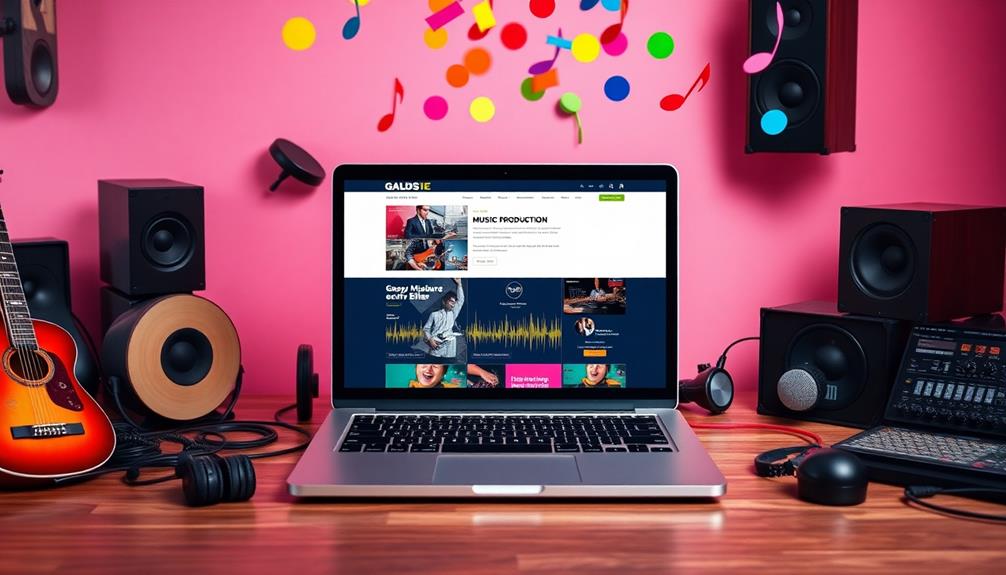
A music website serves as an essential tool for any artist looking to enhance their online presence. With a professional website, you signal to booking agents and industry professionals that you take your music seriously. This credibility can lead to more visibility and opportunities for gigs.
Your website acts as a central hub where you can engage fans by showcasing your music and promoting upcoming events. Having a merch store integrated into your site allows you to sell your music and merchandise directly, creating a revenue stream while fostering deeper connections with your audience.
Regularly updating your website with fresh content keeps fans coming back, which is key for building fan loyalty. Additionally, you can build an email list through your website, making it easy to communicate directly with your fans.
Use this list to share news, exclusive content, and tour dates, ensuring your audience stays engaged and informed. By utilizing your music website effectively, you create a platform that not only showcases your talent but also strengthens your relationship with fans and enhances your overall online presence.
Choosing a Website Builder
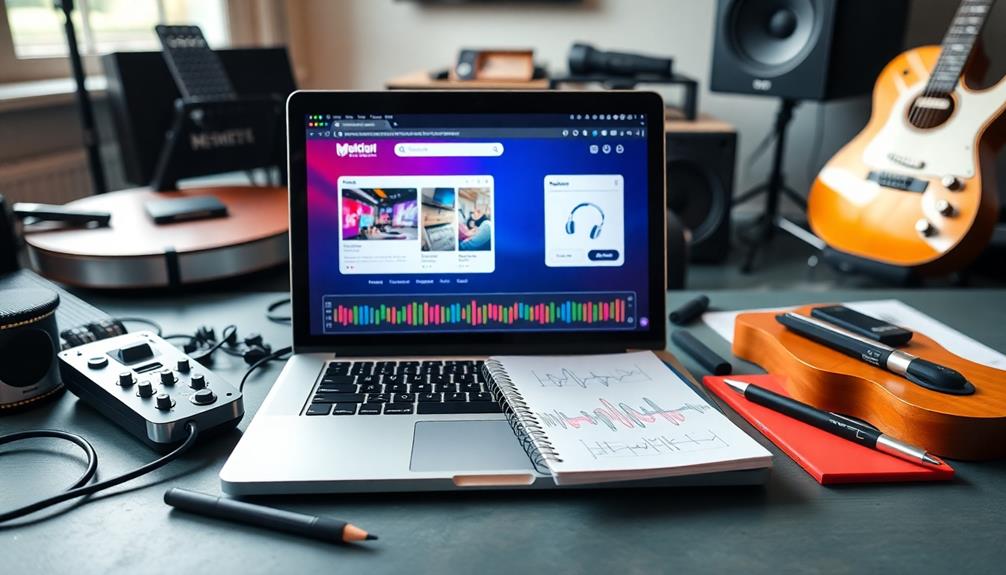
When selecting a website builder, you'll want to keep your specific needs in mind to find the best fit for your music production business. User-friendly options like Wix, SquareSpace, and WordPress cater to non-coders while offering essential functionalities.
First, evaluate your budget and the features you need—like e-commerce capabilities for selling beats or an embedded audio player for showcasing your music.
Next, choose a website that offers templates aligning with your musical brand. A limited color scheme of 2-3 colors can enhance your site's visual appearance, creating a professional look.
Look for builders that prioritize customization and drag-and-drop functionality, allowing you to create a website without needing extensive technical knowledge.
Essential Website Features
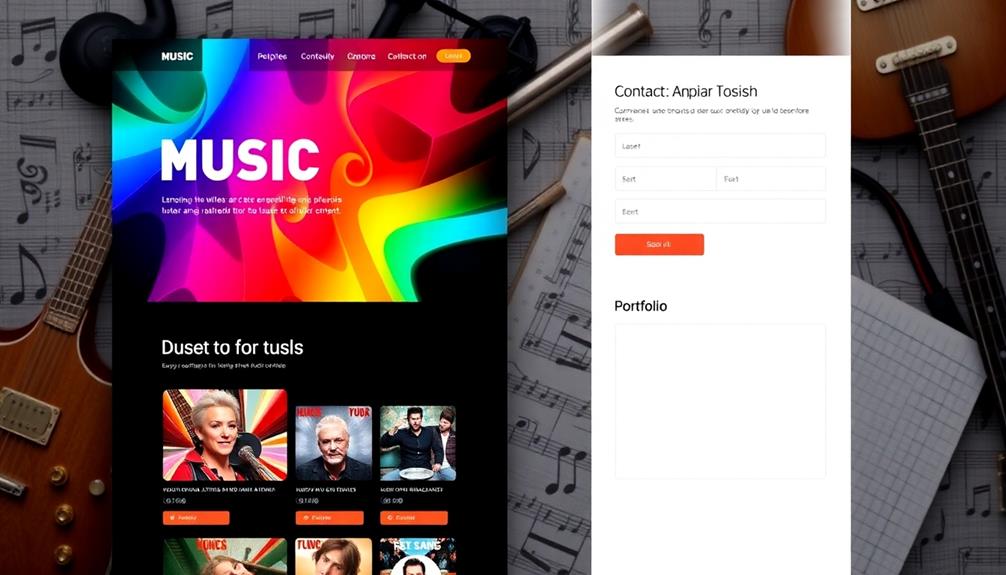
When building your music production website, it's essential to include features that truly resonate with your audience.
A music player lets visitors listen to your tracks instantly, while a portfolio showcase highlights your best work.
Plus, easy-to-find contact information encourages collaboration and keeps the conversation going.
Music Player Integration
Integrating a music player on your website instantly elevates the user experience, allowing visitors to immerse themselves in your tracks without delay. A well-placed music player boosts engagement and encourages longer site visits, making it a must-have feature for your music production business.
Here are some key points to reflect on when adding a music player:
- Format Support: Verify your music player supports various formats like MP3 and WAV to cater to different fan preferences.
- Streaming Options: Offer options for streaming, downloading, and purchasing your tracks, giving your audience the flexibility they desire.
- Call-to-Action: Position the music player prominently on your homepage to showcase your latest releases, turning it into a compelling call-to-action.
- Platform Links: Embed links to popular streaming platforms like Spotify and Apple Music alongside your music player to expand your audience base and increase your reach.
Many website builders, such as Wix and WordPress, offer simple ways to integrate music players without needing coding skills.
Portfolio Showcase
A portfolio showcase is essential for your music production website, serving as a dynamic representation of your talent and creativity. It should feature high-quality audio samples of your previous work, allowing potential clients to easily assess your style and expertise. By incorporating detailed descriptions for each project, you provide context on the creative process, the type of music produced, and any notable collaborations, which enhances the overall presentation.
Additionally, showcasing your work can help demonstrate your proficiency with various music production software, further attracting potential clients.
To make your portfolio more engaging, include visual elements such as behind-the-scenes images or videos from your recording sessions. These not only capture attention but also help tell the story behind your music. Regularly updating your portfolio with recent projects keeps the content fresh and relevant, demonstrating your ongoing activity and growth within the industry.
Additionally, integrating a user-friendly navigation system within the portfolio section guarantees that visitors can easily explore different categories of work, such as genres or types of projects. This enhances user experience, making it simpler for potential clients to find what they're looking for.
An effective portfolio showcase is your opportunity to impress and connect with your audience, so make certain it reflects the best of what you have to offer.
Contact Information Availability
Having easily accessible contact information on your music production website is vital for fostering communication with fans, clients, and industry professionals. A well-designed contact page can notably enhance user engagement and guarantee potential clients can reach you without hassle.
Additionally, maintaining an organized approach to communication can help manage business relationships effectively, especially in an industry where Credit cards play a considerable role in personal finance stability.
Here are some key features to include:
- Contact Form: A customizable contact form lets visitors submit inquiries directly, keeping them on your site and enhancing accessibility.
- Email Address: Use a dedicated email address for business inquiries. This projects professionalism and helps you organize communications effectively.
- Phone Number: Including a phone number provides an alternative for those who prefer direct communication, making sure you're reachable.
- Social Media Links: Displaying your social media links encourages visitors to connect with you on various platforms, broadening your communication channels.
Regularly updating your contact information is essential so that potential clients don't encounter outdated details.
This proactive approach not only facilitates smoother communication but also builds trust. By implementing these features, you'll create a more inviting atmosphere, fostering stronger connections with your audience and paving the way for successful collaborations.
Content Creation and Multimedia
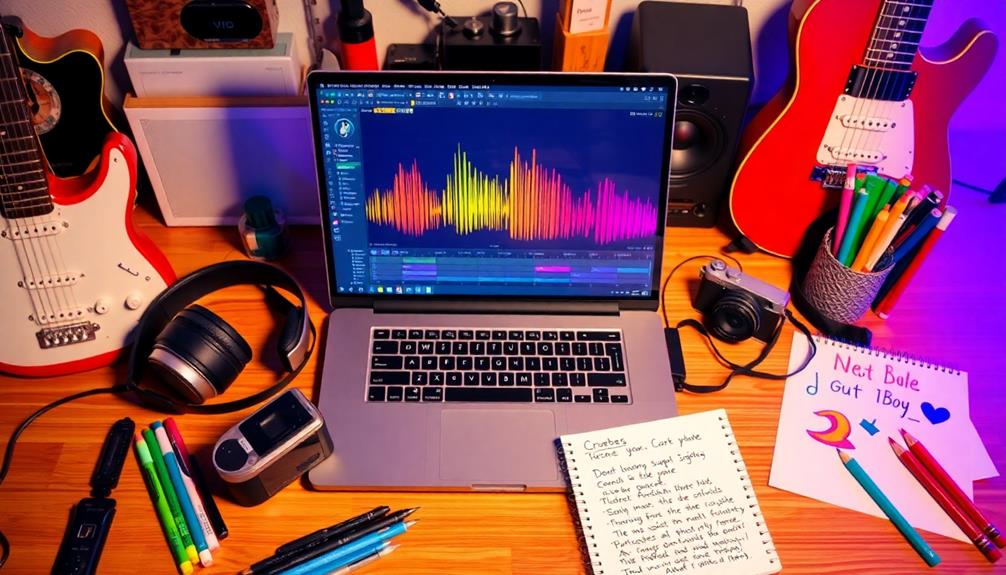
To truly engage your audience, you need to incorporate multimedia elements that resonate with them. High-quality audio samples and enchanting visuals can turn casual visitors into loyal fans.
Explore apps designed specifically for music creation to enhance your content further. By showcasing your music through these engaging formats, you'll create a more immersive experience that keeps them coming back for more.
Engaging Multimedia Elements
Engaging multimedia elements are essential for creating a dynamic website that captures your audience's attention. By incorporating these elements, you can notably enhance user experience and encourage visitors to explore your music online.
Here are four key multimedia components to include:
- Embedded Music Player: Allow visitors to listen to your tracks directly on your site, increasing engagement and showcasing your work.
- High-Quality Images: Use stunning visuals, like performance shots or behind-the-scenes photos, to make your site visually appealing and memorable.
- Video Integration: Leverage platforms like YouTube to host videos, improving your site's SEO and drawing in more visitors through engaging content.
- Photo Gallery: Create a gallery that showcases your work, events, and creative process, helping you build a personal connection with fans.
Additionally, regularly updated multimedia content, such as vlogs or tutorials, keeps your audience coming back for fresh insights and entertainment.
High-Quality Audio Samples
When it comes to showcasing your music production skills, high-quality audio samples are a must-have. They play an essential role in influencing potential clients' decisions to hire you. Make certain your audio samples are available in popular formats like WAV or MP3, with a bitrate of at least 320 kbps for peak sound quality. This guarantees that your work shines through.
Incorporating a variety of genres and versatile styles not only demonstrates your skill but also attracts a broader audience. A dedicated audio player on your music producer website allows for seamless streaming, enabling visitors to listen to your samples without interruption. This enhances the user experience and keeps them engaged.
Don't forget to regularly update your audio samples with new projects or collaborations. A fresh portfolio not only showcases your growth but also helps engage returning visitors who are excited to hear what you've been working on.
Pairing your audio samples with high-quality images can further elevate your website, creating a professional and inviting atmosphere. By focusing on these elements, you'll effectively showcase your music and set yourself apart in the competitive music production landscape.
Navigation and User Experience
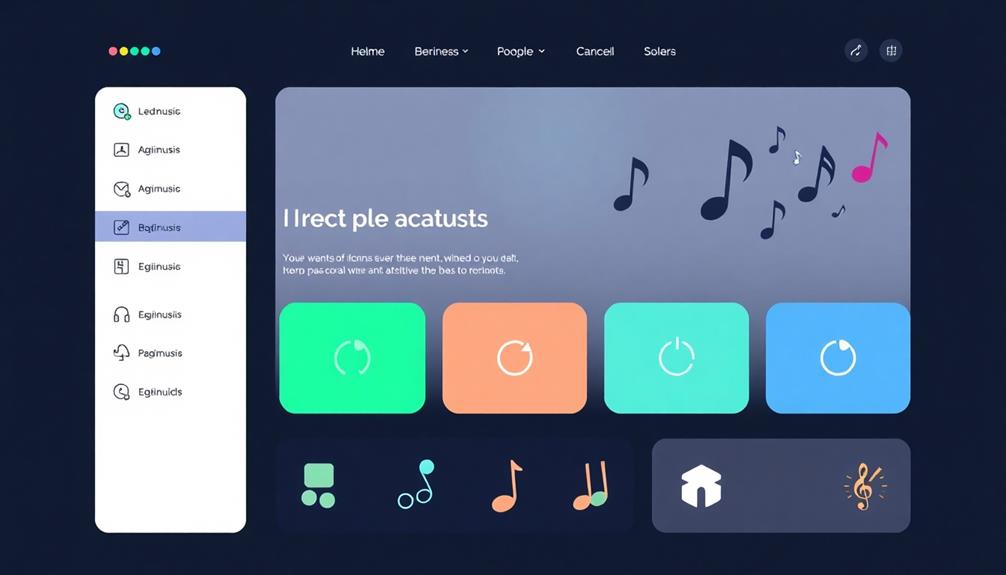
A well-structured navigation menu is essential for any music production website, guaranteeing you can easily access important sections like Music, About/News, Services, Testimonials, and Contact.
By organizing website pages by importance, you enhance user-friendliness and make it easier for visitors to find the information they seek.
Here are four key elements to regard for effective navigation and user experience:
- Intuitive Navigation: Design your navigation menu to be straightforward, allowing users to move seamlessly through your site.
- Search Function: Incorporating a search function enables visitors to quickly locate specific information or services, enhancing their overall experience.
- Regular Updates: Keep your website content fresh and relevant to maintain interest and engagement, encouraging return visits.
- Responsive Design: Guarantee your music website templates are mobile-friendly, as many users will access your site on their phones or tablets.
Marketing and Promotion Strategies
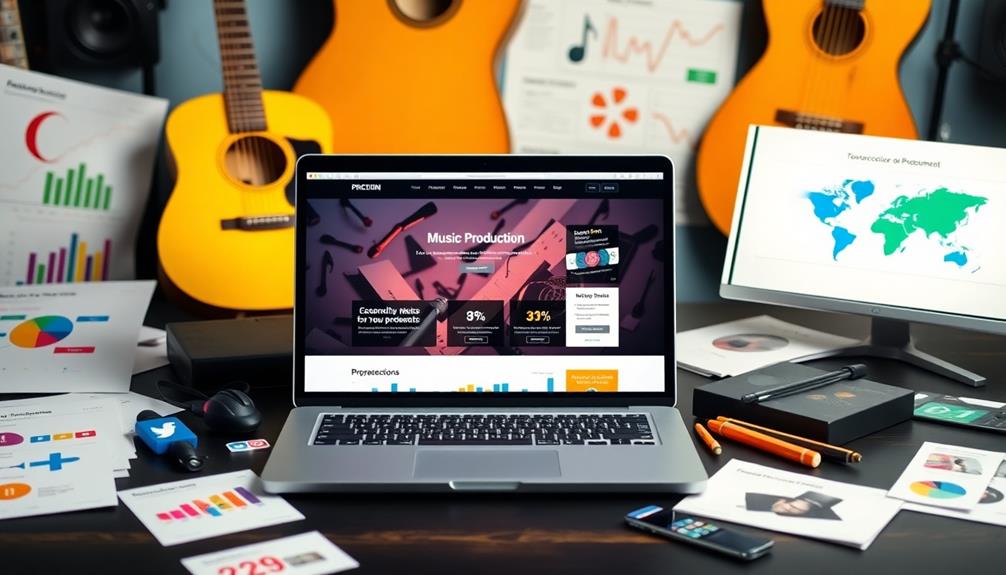
An effective website is just the beginning; to truly thrive in the music production industry, you need to implement smart marketing and promotion strategies.
Start by utilizing social media platforms like Instagram and TikTok, which are essential for showcasing your work creatively and reaching wider audiences. Engaging content, such as behind-the-scenes videos or production tutorials, helps keep your fans invested in your music production business.
Building a mailing list is vital for direct engagement. Use email marketing strategies to send regular newsletters and exclusive content, allowing you to foster a loyal community.
Additionally, leverage music promotion tools like SubmitHub and Playlist Push to increase your visibility and secure placements on popular playlists.
Don't underestimate the power of collaboration. Partnering with other artists and influencers not only helps you cross-promote your work but also builds a supportive network around your music brand.
Frequently Asked Questions
Do Music Producers Need a Website?
Absolutely, you need a website! It showcases your work, enhances your credibility, and helps attract clients. Plus, it centralizes your music and services, making it easier for potential collaborators to find and contact you.
How Do I Create My Own Music Website?
To create your own music website, choose a user-friendly builder, select a music template, optimize for SEO, showcase your tracks, and use analytics tools. You'll engage fans, attract clients, and enhance your brand.
Should I Make a Website for My Music?
Absolutely, you should make a website for your music. It showcases your work, attracts fans, and helps you connect with industry professionals. A well-crafted site can elevate your presence and grow your audience markedly.
What Is the Best Music Production Website?
Imagine visiting a sleek, mobile-friendly site like Splice, where you explore stunning audio samples and client success stories. The best music production websites combine professional design, SEO optimization, and user-friendly navigation to engage visitors effectively.
Conclusion
Creating a website for your music production business isn't just about having a digital presence; it's like crafting your own stage where your creativity shines. Picture potential clients discovering your sound, drawn in by enchanting content and seamless navigation. With the right tools and strategies, you can turn your site into a vibrant hub that resonates with your audience, much like a powerful melody that lingers long after the last note fades. Start building your online symphony today!

